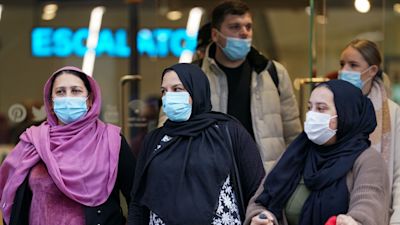Explainer
These are the Covid restrictions left in England as Plan B comes to an end

As Plan B Covid measures come to an end in England, far fewer restrictions now remain.
The requirement to wear a face covering is scrapped and Covid passes are no longer needed to access large venues.
Work from home guidance has already been dropped and masks are no longer required in schools.
As the new changes come into force, what restrictions remain in England?
Isolation
The main legal requirement that remains, despite the end of Plan B, is the requirement to self-isolate if you have Covid.
In January the quarantine time was cut from 10 days to five full days – provided you produce a negative test result on the fifth and sixth days, and do not have a temperature.
Tests must be at least 24 hours apart. If either test is positive, you must wait 24 hours before testing again.
This measure is due to expire on March 24 and the prime minister said he does not foresee the need to extend beyond this date.
In fact, there is a chance the need to isolate could be dropped before then – though Health Secretary Sajid Javid told ITV News no decision has been made.
Listen to our coronavirus podcast:
Travel
Changes to the travel rules were already announced in advance of Plan B ending.
From 4am on Friday, February 11 fully vaccinated passengers entering England will no longer need to book Covid tests.
The rules before then mean fully vaccinated travellers must pre-book a Covid test from a private supplier (lateral flow or PCR) and take it, at most two days after arriving in the country.
Rules for non-vaccinated travellers remain the same - they must take a pre-departure test and two post-arrival PCR tests.
They must also self-isolate for 10 days after arriving in England.
Other non-legal measures
While face coverings are no longer mandatory, the government does still suggest they are worn in crowded and indoor spaces mixed with people who you would not normally meet.
Many shops and supermarkets are asking customers to continue wearing masks and train operators too.
Local public health leaders can still recommend the wearing of face coverings in communal areas, including education settings that fall under their jurisdiction. The government says this should only be where the measure is proportionate, and added it was only temporary.
When rules on face coverings were eased in July 2021, NHS England reissued guidance that masks were still required in healthcare settings - as was social distancing.
By law, there will be no requirement for Covid passes, but some venues may still decide to do so voluntarily.
So how do we combat the virus?
Plan A largely relies on the vaccine rollout.
“Plan B has given us the time to get people vaccinated,” Mr Javid told ITV News earlier this month.
“We’ve produced more and more antivirals, we’ve got some five million courses of antivirals – that’s more per person than any country in Europe.
“We’re now doing more testing per head than any other country in Europe. And these three things taken together play a hugely important role – the vaccinations, the antivirals the testing.”
Health Secretary Sajid Javid explains why he believes the country is prepared to end Plan B restrictions
In the longer term, Mr Johnson told the Commons earlier this month that a strategy will be published in the near future.
He said: “We will set out our long-term strategy for living with Covid-19, explaining how we hope and intend to protect our liberty and avoid restrictions in future by relying instead on medical advances – especially the vaccines which have already saved so many lives.
“But to make that possible, we must all remain cautious during these last weeks of winter.”